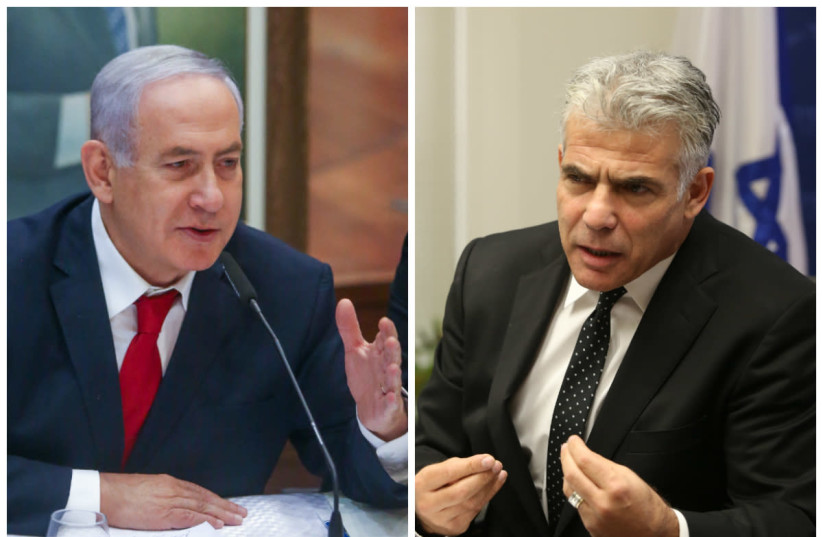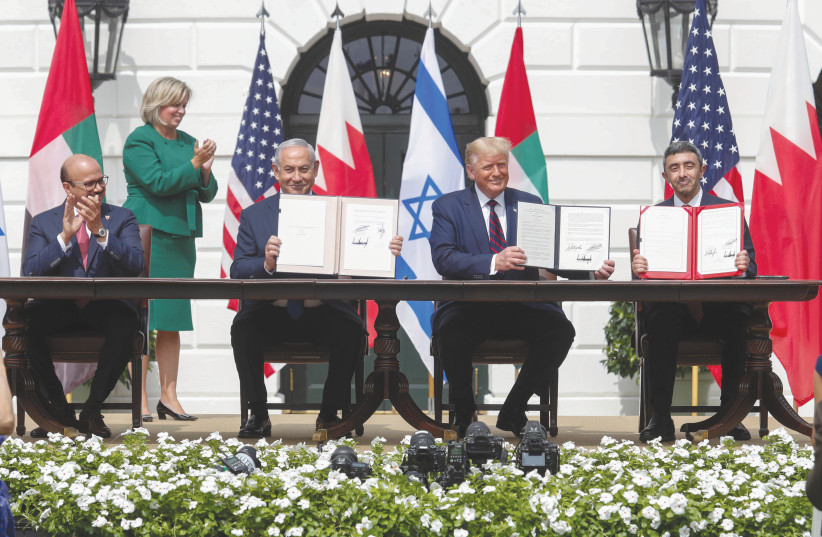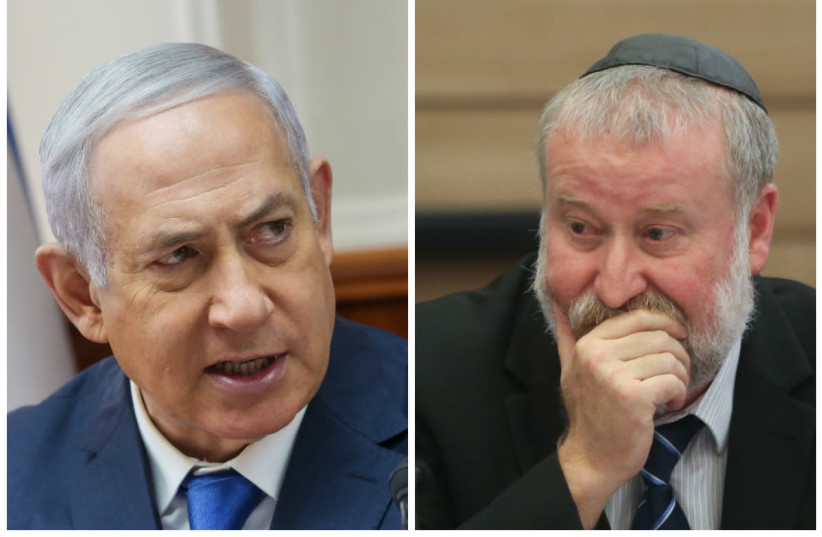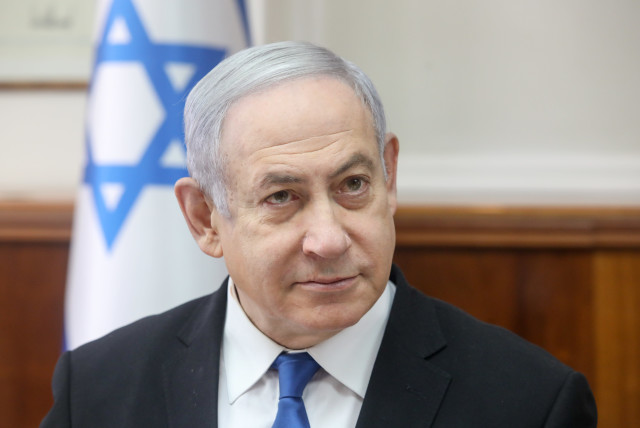Lahav Harkov: This is an exciting week with everything opening up after all the coronavirus restrictions, but there is one question I hear often from the olim community. When can they visit their parents and their parents visit them? Right now, I know only Georgia accepts the "Green Passport" [Israeli vaccination certificate].
It’s a great thing. Israel is leading the world in vaccines; Israel is leading in coming out for the economy. I personally intend to devote myself this year to the economy so we are not merely the world champion of vaccines – vaccination nation – we’re also going to be the world champions in having the fastest-growing economy, which includes tourism and travel.
BN: Well, the minute I form the next government the first decision that I make will be to pass the remaining economic stimulus in addition to NIS 100 billion that we put forward. Israel’s economy is in good shape. We still have a task to revive the rest of the economy. The real question that we have in the next few weeks – the first day that I form the next government, I’ll bring another 15 billion.

If you have a plane you need to fly and you are a passenger, who are you going to let fly the plane? The guy that’s experienced, who’s got proven results, who’s recognized around the world at having made this economic breakthrough for Israel, or somebody who doesn’t know how to fly the plane? So the plane either doesn’t even take off or it crashes. It’s either me or [Yesh Atid leader Yair] Lapid, or his strange co-pilots. This is the decision that I think people understand, that to revive Israel’s economy, you need a pair of safe hands, experienced hands, a real pilot. It’s me; it’s not him.
BN: A few years ago, I brought the head of the OECD – that’s the organization of developed economies. I turned Israel from a developing economy to one of the world’s most advanced developed economies, but I wasn’t satisfied with that. I brought the OECD guy to the cabinet and I said “tell them,” and he said, “you’ve done great things under the prime minister. You’ve lowered tax rates, you reduced the public sector, you energized the private sector, but you still have a lot of regulation.” And I said “tell them where we are.” Six years ago, we were the last place in the OECD except Turkey. I formed a government committee where every two weeks, I or the director-general of the Prime Minister’s Office chopped, with a machete, regulations. We moved 18 places, more than any other country in the world, in deregulating.
But that’s not enough for me. I want to bring us into the top 10.
Now, who will do this? Who understands this? Yair Lapid who understands nothing about the economy? [New Hope leader] Gideon Sa’ar who never led the economy? [Yamina leader and former economy minister Naftali] Bennett himself who never led the economy on anything?
I’ve done enormous results. I will deregulate, because it is in my blood. I love chopping the bureaucracy. I love to do it! It’s not really that it’s good for the country; it’s good for me! I like it! So I will do it.
They’re just yakking away. They talk, talk, talk. They do nothing. But we brought Israel to have, right now, to be in the position that we’re emerging from corona with virtually the strongest economy in the world, with the shekel at a 12-year high, our credit ratings are at an all-time high.
We still have a job to do. I’ll tell you what the biggest problem is going to be. The biggest problem will be – I will get the economy launched, for sure. They won’t. They don’t know how to do it – but there is another factor. The economy could tank again. If we don’t bring tens of millions of new vaccines, if we don’t do that, then we’ll go back to lockdowns and so on.
I’m working right now with Pfizer and Moderna to bring tens of millions of new vaccines and I am working to create plants to produce vaccines here. Who’s going to do that? Is Yair – Yair who? Do you know how many prime ministers and presidents call Pfizer, call Moderna. They don’t take the call. They took my call, and I persuaded them that Israel will be the model of success for vaccines, and lo and behold that’s happening. But who will continue to do that? Not Lapid, not Bennett, not Gideon. They just don’t have it. I have it. And I will bring the economy up.

BH: Well, first of all, let me say that President Biden, Joe and I, have had a very close relationship for close to 40 years. I’m not just saying that. It’s real. He delivered a wonderful eulogy for my father; I spoke to him after the tragic death of his son Beau. We have a close relationship, and that’s important for the country.
So that can happen, but when I deal with the US, our indispensable ally under changing administrations, I always remember one thing: I represent the State of Israel. I don’t represent Republican interests; I don’t represent Democratic interests; I represent Israeli interests. And when I need to take a stand for something that I think is important for Israel’s survival and security, I don’t hesitate to do it under any administration.
BH: No, I think what he did recognizing the Golan under Israeli sovereignty, recognizing Jerusalem as Israel’s capital, moving the embassy here, getting out of this dangerous Iran deal, and I think these are great things. And of course, I embraced it, because that’s my policy.
When an American administration does things that are good for Israel, then I definitely embrace it. But that’s what guides me. Policy guides me. The interests of Israel guide me, and I’m sure that if there is anyone who can ensure Israel’s interests are protected in the world and the US, it’s me.
What standing to these people have? Can they fly the plane? The answer is no, they can’t.
And you know if there are pressures that come against us, and that could happen, I don’t deny that. There could be pressures on Judea and Samaria, on our Jewish communities there, you need someone who’s strong who can stand up for our interests. I believe that everybody knows in the Anglo community; they know better than anybody else that I can do what others cannot do.
BN: I think if it weren’t for the effort that I led worldwide, including going to the American Congress and standing up against this Iran deal, Iran would have already had not a nuclear bomb, but an arsenal of nuclear bombs. The political leadership that I put in front of the whole world – the six leading powers in the world were supporting this and I opposed it – the actions we took including sending the Mossad into the heart of Tehran and yanking away their secret atomic archive with 100,000 documents that showed they’re pursuing nuclear weapons under different guises, and many other activities that I won’t itemize, that I authorized personally, without that, Iran would already have had a nuclear arsenal.
And in fact, the only one who’s going to continue that is me.

That’s the difference. Who will do this? Yair Lapid, who said that my speech to Congress was a terrible blow to Israel’s security interests? This is the man that will stop Iran? Or the others who have no standing at all? You need a leader with a world standing to resist the ongoing attempts of Iran to arm themselves with nuclear weapons.
Because of what I did, Iran has been set back for years, and because of what I will do, they will never, ever have a nuclear weapon. As long as I’m prime minister, Iran will not have atomic bombs.
BN: Well, I can say that there is a realignment in the Middle East.
I think you should know that when I gave that speech in the US, the one that Yair Lapid, who wants to be prime minister, who will be prime minister if the Anglos don’t come out and vote for me, he’ll be the prime minister. You’re going to get Yair Lapid as prime minister! Along with a strange rotation with Bennett and Gideon already fighting who will sit on the chair. They can’t fly the plane. They just want to sit in the cockpit. They have no idea how to fly the plane!
So when I gave that speech that Yair Lapid criticized, during the speech, in a literally live transmission, we got calls from Arab leaders in the Middle East who said “we can’t believe what your prime minister is doing right now. He’s standing against the whole world, against the US at the time, and he’s lifting the torch of resistance against Iran’s nuclear program.”
That’s really what did the pivot. That’s what made them come to Israel. That’s what forged the four historic peace agreements that we have today. Because they saw Israel not merely as a source of technology for everything, clean energy, hi-tech, water and so on. They saw Israel as standing up against Iran, which threatens them. It threatens us more, with destruction, but they understood that, so Israel became an indispensable ally.
But Israel under whom? Yair Lapid? Gideon? Bennett? They can’t fly the plane. They cannot protect Israel.
BN: What’s it like asking questions that you know you can’t get an answer to?
A lot of olim are interested to hear what you think about this new Supreme Court decision allowing Reform and Conservative conversions to be recognized for purposes of Aliyah.
BN: I think we shouldn’t draw this connection from the [Law of Return], I think that’s important. I’m very liberal on conversions, because I am the only prime minister that enabled reforms in conversions in the army, and now we have the Nissim report I am very favorable to it and we’ll probably adopt either the report or something like it, so I have no hesitation about that.
But I think we have to be very careful, very, very careful about tampering with the Law of Return, because the Law of Return gives us the protection, making sure Israel is the nation-state of the Jewish people.
Any Reform, Conservative person, Israel is their home; that’s not an issue. People can do this and they can come here and that’s fine.
The real issue is we have to protect and prevent fake conversions that could enter the country. You know a lot of people want to come into the country.
In fact, I put up a fence, you know. They call it a wall. But I prevented the overrunning of Israel, which is the only first-world country that you can walk to from Africa. We would have had here already a million illegal migrants from Africa and the Jewish state would have collapsed.
The Jewish State, Conservative, Reform, Orthodox, would have collapsed.
BN: Not only from there, you could have it from the entire world. I think we can solve the problem of conversion for all streams and all denominations in Judaism, but we also have to protect the borders of Israel so that we’re not overrun. I think we can find a balance between the two. That’s what I intend to do.
I’ve done it, because without the security barrier that I built, the physical barrier that I built across the Sinai, we would have had today a million illegal migrants from Africa. I saw the cities of Israel be flooded. I was in Eilat, a mother was crying to me, she said “I can’t send my daughter out.” I saw this in Tel Aviv, I saw this everywhere, and I stopped it.
By the way, the bureaucracy was dead against it. They said “it won’t work.” And I said: It will work, build a fence. I went there every three months. I can fly the plane. I can protect Israel.
You know what we say, the Anglo-Saxon word, kabbalot, I have a record, results, receipts. And they don’t, they don’t have it. They are full of ambition, but they have no record, no experience, no capacity, no proven ability and now we have to fly the Israeli plane. Who’ll fly the plane.
BN: I think we need judicial reform. I think everybody understands there’s been an imbalance. The great thing about democracies – I’m a big democrat with a small D, I’m not a Democrat or a Republican – but the great thing about democracies is they have a balance between the three branches of government. I think sometimes we lost the balance in Israel. Ultimately, each one balances the other and if you look at where we have to give an extra edge to someone, it’s the parliament, the Knesset, because it represents the will of the people. And I think that in many ways, we’ve lost that balance and we have to restore it with judicial reform. One hundred percent.

BN: No, I think what undermines the rule of law is when the prosecution is, as Justice Jackson, one of the great American jurists said “It’s when prosecution uses rules or creates rules,” in my case they created a new crime, they created a crime that doesn’t exist in the rulebooks of the US or any other democracy in the last 244 years, when they have a fake witch hunt, with fake charges, with blackmailing witnesses. It’s unbelievable. Erasing documents, creating a new crime – it’s ridiculous. The whole thing is just collapsing.
But it’s not only in my case. I heard the idea the idea that people are being blackmailed from the “law and order gang” – I heard this from the president of Israel, I heard it from Prof. [Daniel] Friedmann, who was the justice minister, I’ve heard it from so many others, and I heard it, believe it or not, from the attorney-general himself, when he was being charged. [Attorney-General Avichai Mandelblit was investigated, but never charged – LH] So everyone understands there has to be a reform.
The rule of law is protected when people don’t do witch hunts, when they don’t try to bring down a strong, right-wing prime minister with judicial means. They can’t defeat Bibi in the polls, so they use these absurd charges that will collapse and have collapsed.
BN: I’ve been here all the time; you just didn’t notice. From the year 2010, the year I became prime minister for the second time, until now, that’s 11 years, I put in 21 billion shekels for the Arab sector. Nobody noticed. For infrastructure, for education, for welfare, for sewage, for roads, for transportation. Nobody noticed, but they noticed.
The other thing that I did, was that I built nine police stations. We had only one in the Arab communities. They deserve real law and order the way all of us do.
And I made four historic peace treaties with Arab countries. I did this for all our citizens, and the Arab citizens understand that. They understand that all these other parties were taking them to a radical cul-de-sac, a place of irrelevance, basically. They didn’t deliver on their promises, but we are.
And I have a vision, which is really a classic liberal vision, in the traditional sense of the word, that this every citizen of this country, every child of this country, every girl and boy should have an equal opportunity in education, in having a safe environment, to open a business, to get credit, and that’s what I’m doing.
I’m changing things because it’s a battle between modernity and medievalism. The Islamists want to take us back, the modernists like me want to take us forward. I want them to be involved, and you know what, they’re coming to Likud because they understand that what I said is true.
This is my vision. I’d like to see what I see in Dubai and Abu Dhabi in the Arab communities here. You think that’s impossible? I think it’s possible. It’s happening in the Jewish parts. Why can’t it happen in the Arab parts?
BN: Because we’ll get a lot more. Because if the Anglos that listen to me now and the other people who support the Right – there is a very strong right-wing majority in Israel. It’s at least 70, some say as much as 80 [seats in the Knesset]. And basically, mainstream media is trying to get us to sleep or try to divide us so we don’t have the strong right-wing government under me, strong with one head and not three heads competing with each other. We have that possibility right now. If people come and vote, then we are going to get a lot more than 61.
If you sit at home, you’re going to get [Labor leader] Merav Michaeli who said you shouldn’t go to the army, or this woman [Labor candidate Ibtisam Maraneh] who said you shouldn’t rise in the time of the [siren for Holocaust Remembrance Day]. You’re going to get a Meretz government, and you’re certainly going to have the whole reliance on the Arab List.
BN: I think that everybody should recognize that we are advancing a government that is working for all of Israel’s citizens. I, for one, object to the idea, this attempt to constantly divide and attack, one part of the population against the rest. They’re moving with us, they’re joining the workforce in record numbers because of my, frankly, my free-market approach and the reduction all the time of dependence on the government.
I think that what has happened is the haredi community is joining modernity. That’s the right thing to do.
And by the way, the other parties are all sending feelers to the haredi parties, so they’re just lying through their teeth.
But the real thing is to have the haredi community, the Arab community integrated into this tremendous success story, this miracle that is the State of Israel and the miracle is based on the free-market reforms that I put in and will continue to put in and draw everyone in. That’s the real solution to our future.
BN: Well, first of all, I read a lot of books. That’s not only a haven and an escape, that’s the way to recharge your intellectual batteries. Kissinger said, “once you enter political life, you deplete your intellectual capital.” I found exactly the opposite. I read many, many books. Usually, history, biography.
Dan Rather, the famous television personality in the US, brought his grandson here. His grandson goes to Brown. He said “I’d like to go to politics, what should I study?” And I said, three subjects. History, history and history.
BN: It helps. I’m an architect of other things. But I know history first. So I read a lot of history books.
BN: Yeah.

BN: I think two things. One, the protector of Israel, because I devoted much of my adult life to preventing Iran from having a nuclear weapon. And you have to ask that question, if Iran has atomic bombs and it has a specific public diplomacy stated goal to destroy the state of Israel, everyone, left, right, Arab, Jew, they want to wipe us off the map. I have devoted my life so far successfully to preventing them from being able to do that, and as long as I am prime minister, they will never be able to do that. So that’s my legacy, the protector of Israel.
And the second thing, the liberator of its economy, because I have introduced a free-market economy. All the others are just yakking away. They tweet they talk and they haven’t a clue how to do it, but I’ve done it.
I went to a very good business school at MIT, and then I went to the best place that I could learn about liberating economies, the Boston Consulting Group, which is like the Sayeret Matkal of all consulting firms, and I learned there. I had a great teacher there, his name was Bruce Henderson, a Virginian. He was 75 years old, and he called me into his office, and he said: “I know you’re going to go back to your country. You won’t be here long. But study and listen everything you can gain here, because one day, it will help your country’s economy.” I thought he was stark-raving mad, but he was absolutely right.
And I’m so proud of the dozens and dozens of reforms that we’ve made launching Israel to be one of the great advanced economies of the world, and you ain’t seen nothing yet. I’m going to bring 5G, robotics, biology, life sciences, clean energy, cyber. I’m going to turn Israel into a cyber power, a gas power. The sky is the limit.
I’m going to do this, and I’ll tell you one thing else – Billions and billions of dollars that are coming in from the peace treaties that I brought in, that nobody believed I would bring in. Peace for peace, not peace for tearing away Jews from their homes. This is going to make Israel a great, great country, one of the greatest economies in the world.
So, the protector of Israel and the liberator of its economy. That’s it.
